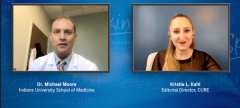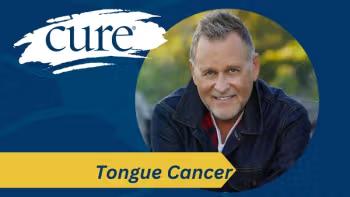
Addressing HPV-Related Head and Neck Cancer
Kristie L. Kahl: Can you discuss the rise in types of head neck cancer that are being found in younger adults? And how is this related to possibly HPV?
Dr. Michael Moore: Yeah, so this has been a really alarming trend we've seen over the last 30, 40 or 50 years in America and actually in other parts of the world. In the past, the main risk factors for mouth and throat cancer were to use tobacco and alcohol and as our society as a whole have gotten better, as far as curbing these risk factors, the incidence of many of these cancers has actually been going down. But we noticed that there was one type of cancer that was continuing to go up. And what really became clear over time, is that many of these cancers are actually related to a particular type of virus called the HPV virus that can affect certain areas of the back of the throat. And these cancers often develop in people who don't have the classic risk factor. So they may be nonsmokers or nondrinkers. And I think because of that many of these people and their doctors didn't consider these people at high risk for cancer and as a result may result in a delay in their diagnosis.
Kristie L. Kahl: Can you discuss what exactly HPV is?
Dr. Michael Moore: Yeah, so the HPV virus is a group of viruses. There are many different subtypes, some of which are ones that can predispose to cancer and some can predispose to other things such as warts, what are called papillomas, which are benign growths within the mouth or throat or you can get warts on other parts of the body, including genital warts. And HPV16 is the strain that's most closely linked to many types of cancer, but there are other strains as well, such as HPV18, and a few others, that can also predispose to it and the majority of people who, at least the majority of adults in America at some point during their life, we're going to get exposed to it. And most people will clear the infection on their own, but a small group of people will maintain that persistent infection and then in those people, that DNA of the virus can actually get incorporated into the lining of the mouth and the throat, predisposing them to development of certain types of cancers.
Kristie L. Kahl: For head and neck cancer, who is at risk for HPV-related head and neck cancer?
Dr. Michael Moore: Yeah, so anybody who's been affected by a persistent infection with HPV16 can be at risk. That studies have shown that on a population level, boys and men are at higher risk than women at about a four-to-one ratio. The typical age of presentation is usually in the early 50s, which is about three to five years younger than head neck cancers that are related to tobacco use, but they can happen in folks younger. It can also happen in women as well. So we certainly think it's important to make everybody aware of this.
Kristie L. Kahl: How can the HPV vaccine play a role when it comes to preventing this disease?
Dr. Michael Moore: I think it's a great question. So it can actually prevent the infection that causes these cancers. It's been shown to be over 90% effective at preventing oral infections of HPV, which is the key precursor to development of many of these cancers. And the goal is really to impart immunity before you've been exposed to it and the typical recommended age to start the vaccination series.
It's a two-part vaccine if you receive it before age 15. And it's recommended to start it as early as 9 or 10. And the idea then is you're, one, getting it into the body and making the body immune prior to exposure. But also, there's a more robust immune response at that age, rather than if you get it later. It can be used as a catch-up vaccine, if you've not received the vaccine, you still can get it all the way up to at least age 26. But it's more effective, obviously, if you get it earlier, because the goal is to be immune prior to getting exposed. The current FDA indications actually even approve it for use up to age 45. But in all those instances, you should have a discussion with your doctor, if it's right for you.
Kristie L. Kahl: What should parents know about getting their children vaccinated?
Dr. Michael Moore: One, it's been shown to be very safe. it's as safe as any other adolescent vaccine with very rare, severe reactions. The most common one is discomfort around the injection site. And occasionally, people do feel a little lightheaded very soon after getting the vaccine. So it's recommended to have them be observed for about 15 minutes after getting the vaccine.
In addition to that, some of the initial concerns of the fact that if you give your child this vaccine it is going to make them be more sexually active. And actually, studies have shown that is not the case. It's not some sort of a free pass, and then all of a sudden make people feel that they are able to go out and be more sexually active earlier in life.
But I think in reality, the biggest message that we like to bring home to people is it is a cancer prevention vaccine. So obviously, the goal is to prevent the infection. But this is really a rare opportunity that we have to prevent cancer before it even gets started. And why it's particularly important for mouth and throat cancer is, as we mentioned earlier, we don't have a good screening test for this. These cancers often develop in areas of the back of the throat that we can't see on physical exam, and by the time they manifest themselves, they are at a much greater stage and much more significant treatment is needed to get rid of them. And so,s as a result, it's a rare chance we can prevent the cancer before it even gets started.
Kristie L. Kahl: If someone gets the vaccine later in life, what should these individuals know about the fact that there's still an option to get the vaccine?
Dr. Michael Moore: Yeah, so the vaccine covers nine different strains of the HPV virus. So even if they've had some HPV-related infections before, it doesn't mean that the vaccine would not have benefit. And in addition, we're learning more about the vaccine benefits all the time. Studies have even shown that even in instances where they may have had some aspects of disease that were present from a particular virus strain. If you got the vaccine, it may actually reduce the rate of recurrences of those particular lesions, which may be just a manifestation of the body's immune system working even stronger. Obviously, the best case scenario is getting it in your body before you've been infected. But it has shown some benefit later in life, and also has been shown to be a quite safe vaccine as well.
Kristie L. Kahl: How can we improve upon those vaccination rates, especially with declines following the COVID-19 pandemic?
Dr. Michael Moore: Well, we have, sadly. And I think it was inevitable, given a lot of the social distancing requirements and a lot of the conversion of many health visits to virtual visits, for example, which reduced the opportunities to bring these important topics up both with patients as well as their parents. And so yeah, globally, vaccination rates of all types of vaccines have gone down significantly over the past year, but there have been a lot of efforts from many of the main pediatrics organizations as well as family practice organizations that have been focused on how to catch up on many of these. And I think the strategies are linked with, one, just getting everybody back on or their natural schedule, but also potentially, as we're working with the vaccine programs for COVID-19, and demonstrating the efficacy and safety of this, how can we use that messaging to also drive home the importance of these other vaccination opportunities like HPV?
Kristie L. Kahl: How can we help to raise more awareness around the HPV vaccine so we can start to hopefully prevent head and neck cancer?
Dr. Michael Moore: Yeah, I think messages like the one you're doing here are really important. And I think what I've found, at least in my work in this area has been enlisting survivors, because I think nobody's voices are more well respected and are well seen. And then somebody who's actually been through the process and has been affected by these cancers, known what the treatment involves to try and get rid of them. And there's no stronger advocate you will find than somebody who's actually been through the treatment for these types of cancers to say, “Yeah, I much would have preferred to have avoided it from the get-go.” And so I think interfacing with both primary doctors and pediatricians, but also the lay public, so they really have a sense on what these cancers are and why it's so important to prevent them, especially because many of them, like we said, don't have a good screening test to try and catch them early.



